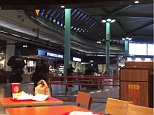A tax on bravery: Undercover police officers get billed for their chase cars as they are taxed as company vehicles
- Undercover officers will have to pay bills of up to £5,000 for their cars
- The officers require high-powered unmarked cars for dealing with gangsters
- The National Police Chief's Council said the tax could damage national security
- Senior officers with unmarked cars have a loophole to avoid the tax
Hundreds of undercover police officers have been hit by a 'shameful' tax on the unmarked vehicles they use to track and chase terrorists and gangsters.
The elite officers have received bills of up to £5,000 after Her Majesty's Revenue and Customs (HMRC) ruled the high-powered cars and motorbikes they drive in their dangerous roles should be taxed as company cars.
Critics have branded the move 'ridiculous', while both the Police Federation – representing rank and file officers – and the National Police Chiefs' Council, say the tax could damage national security.

Undercover police officers face being taxed on their high-powered unmarked cars
Undercover operatives often take their vehicles home so they can respond faster to emergency call-outs.
To date, they have been taxed only on their personal mileage outside working hours, but now HMRC is demanding a levy based on the vehicles' retail value and CO2 emissions – the same as executives' company cars.
Officers told The Mail on Sunday that they cannot afford to pay the additional taxes, and that the move will compromise public safety.
Their treatment is in contrast to that of police chiefs, who have previously fitted blue lights to their executive cars to reduce their tax bills.
Last night, an officer from the Metropolitan Police's Specialist Crime and Operations branch, who used his vehicle to respond to the IS attack on London Bridge in June, said: 'I'm on a £40,000 salary. So there's no way I can pay £5,000 in company vehicle tax to HMRC.
'It's shameful that it's being imposed on us because it will seriously impact on policing.
'I can react faster to an incident, such as London Bridge, because I've got an undercover police vehicle on my driveway, rather than having to drive my own car or get public transport to a depot where these vehicles would otherwise be kept.

Some officers fear they will have to pay benefit in kind tax if they bring the cars home
'But because I effectively commute in this police vehicle to and from shifts and emergency call-outs, I am liable to be taxed on this vehicle by HMRC. The new way it is being calculated has killed me.'
And Christopher Chope, a Conservative MP on the Parliamentary Home Affairs Committee, added: 'This is a ridiculous situation with the HMRC clearly acting at odds with the Government's agenda to improve security.
'It is completely unreasonable for individual police officers to be saddled with this additional tax burden on vehicles, which are an essential part of their very dangerous jobs.'
The HMRC told The Mail on Sunday yesterday that the new arrangement will see officers liable to tax bills based on 20 per cent of their vehicle's market value, the number of days the vehicle is available for their private use and an environmental levy.
The police officer's salary is also a factor. HMRC issued the new directive in April this year but officers have only just been informed of the change.
Police Federation general secretary Andy Fittes said: 'These tax changes could adversely affect the ability of these officers to carry out their vital role in keeping the public safe. No officer should be penalised for doing his or her job.'
An HMRC spokesman said: 'No police officer or emergency workers will incur tax when they just use the vehicle for work.
'Tax can only be payable on the vehicle when it's made available for private reasons.'
-
 'I burst out crying': 'Heartbroken' Mira Sorvino and...
'I burst out crying': 'Heartbroken' Mira Sorvino and... -
 Save the date, world! Meghan and Harry to marry on...
Save the date, world! Meghan and Harry to marry on... -
 'I'm 53, separated and skint': Nigel Farage reveals the...
'I'm 53, separated and skint': Nigel Farage reveals the... -
 Britain is plunged back into the freezer with snow...
Britain is plunged back into the freezer with snow... -
 Mother who gave birth outside lap-dancing club 'an hour...
Mother who gave birth outside lap-dancing club 'an hour... -
 'An apology doesn't cut it at all': Innocent student...
'An apology doesn't cut it at all': Innocent student... -
 'God's gift to women? He's only had two girlfriends!':...
'God's gift to women? He's only had two girlfriends!':... -
 If the Ancient Greeks knew the Earth was round, why do so...
If the Ancient Greeks knew the Earth was round, why do so... -
 EXCLUSIVE: Inside Omarosa's last days at the White House...
EXCLUSIVE: Inside Omarosa's last days at the White House... -
 Dramatic moment armed police shot knifeman threatening...
Dramatic moment armed police shot knifeman threatening... -
 Protester with no legs is shot dead by Israeli troops...
Protester with no legs is shot dead by Israeli troops... -
 Tax cut bill goes public as GOP slashes rates for the...
Tax cut bill goes public as GOP slashes rates for the... -
 Closure at last? Michigan mother hopes remains of three...
Closure at last? Michigan mother hopes remains of three... -
 ‘I don’t regret shooting myself’: Depressed woman who...
‘I don’t regret shooting myself’: Depressed woman who... -
 Battlestar Galactica star Nicki Clyne is the second...
Battlestar Galactica star Nicki Clyne is the second... -
 BREAKING NEWS: Police find toddler wandering the streets...
BREAKING NEWS: Police find toddler wandering the streets... -
 'A bubble almost guaranteed to burst': 'Wolf of Wall...
'A bubble almost guaranteed to burst': 'Wolf of Wall... -
 EXCLUSIVE: Daddy duty! Mark Zuckerberg takes his...
EXCLUSIVE: Daddy duty! Mark Zuckerberg takes his...










































































































































































































































































































